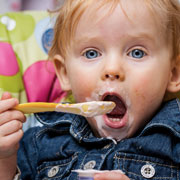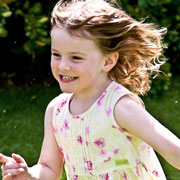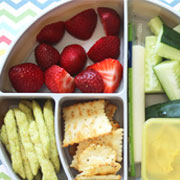A growing child needs teeth to smile and eat with, and to give them confidence. Establishing a good oral care routine from early childhood is important and can be supported by parents and carers.
Start regular effective tooth brushing to remove plaque.
Start brushing your toddler's teeth as soon as they erupt and register him or her with a dentist.
Let your child see all the family brushing their teeth so it becomes a routine daily activity.
You might find that a good time for toothbrushing is playtime or bathtime.
An easy way to brush your child's teeth is from behind. Comfortable and safe positions for your toddler can be on your knee, sitting on a changing mat, in a high chair or in a pram or buggy.
As more teeth come through, develop a system of cleaning them that ensures all surfaces are brushed thoroughly twice each day.
Toddlers should be encouraged to enjoy brushing their own teeth, but children should be supervised until at least seven years and always taught to 'spit don't rinse', because excessive rinsing removes the benefit of fluoride.
Use Flouride toothpaste to strengthen tooth enamel.
Brush teeth twice a day with a small soft dry brush using a toothpaste containing fluoride.
- up to the age of three use a smear of toothpaste containing 1000ppm of fluoride
- over the age of three use a pea sized amount of toothpaste containing 1350-1500ppm of fluoride
Limit Sugar and sugary foods/drinks. To protect your baby’s teeth, it’s important to choose foods without added sugar. Sugar is the main cause of tooth decay, so don’t give your baby sugary snacks, especially between meals. The safest drinks for baby’s teeth are milk and water.
For more information, check out the Childsmile website.
Show your children the cartoon on effective tooth brushing, click here.
Download the brush DJ app, click here








